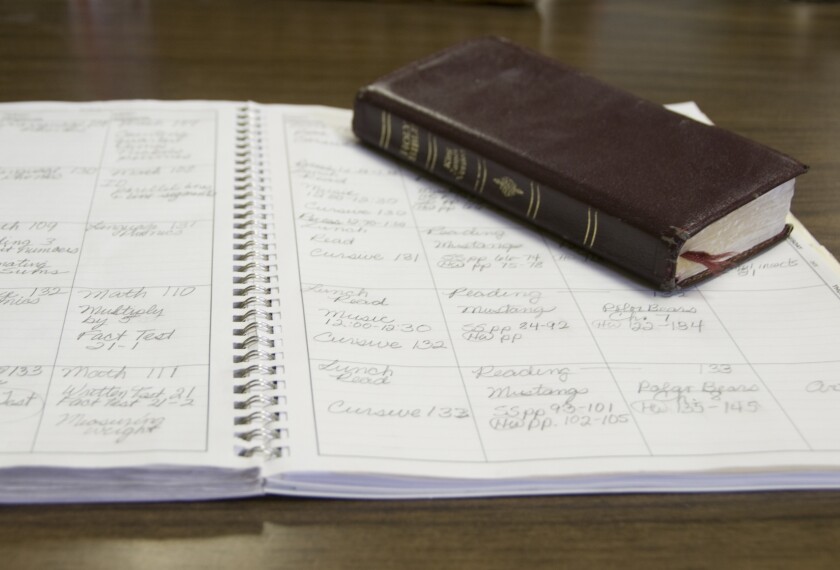Opponents of an Oklahoma directive for schools to teach the Bible are suing the state’s superintendent of public instruction, calling the mandate unlawful and asking the state’s highest court to halt the purchase of materials intended to be taught this academic year.
The lawsuit—brought on behalf of more than 30 community members which include parents, teachers, and religious leaders—was filed with Oklahoma’s state Supreme Court Oct. 17. It argues that the mandate should be ruled invalid, and that political firebrand Ryan Walters, a Republican who serves as the state’s elected superintendent of public instruction, is illegally appropriating funds for the $3 million purchase of approximately 55,000 Bibles.
The complaint states the directive violates the Oklahoma’s constitution by using state funds to purchase religious materials as the mandate “represents a governmental preference for one religion over another.”
Legal experts say this is a case other states will likely be watching, as it comes at a time when conservative state officials are testing the church-state divide. For instance, Louisiana Gov. Jeff Landry, a Republican, recently signed a bill requiring all public schools to display a copy of the Ten Commandments in every classroom. That law is also being challenged in court.
Walters, who announced the Bible mandate in June and issued subsequent teaching guidance a month later, has garnered national attention for his handling of LGBTQ+ student rights and position on teaching about race and racism. He’s been active in former President Donald Trump’s 2024 reelection effort and has said he supports dismantling the U.S. Department of Education. His name has been surfaced as a possibility for education secretary in a Trump administration.
Walters recently drew scrutiny from his own party, with a number of state GOP lawmakers calling for an investigation into his stewardship of the department’s budget, spending priorities, and transparency.
In a statement, Walters said Oklahoma would not be “bullied by out-of-state, radical leftists who hate the principles our nation was founded upon.”
“It is not possible for our students to understand American history and culture without understanding the Biblical principles from which they came, so I am proud to bring back the Bible to every classroom in Oklahoma,” he said. “I will never back down to the woke mob, no matter what tactic they use to try to intimidate Oklahomans.”
The lawsuit argues Bible mandate violates the separation of church and state
The 32 plaintiffs—which include 14 public school parents, four public school teachers, and three faith leaders—argue that Walters is pushing his religious beliefs, violating the separation of church and state.
In the complaint, parents—both those who are Christians, and those who are not—argue that he is overstepping, and that the mandate interferes with the upbringing of their children. One longtime educator believes “the Bible contains confusing concepts, many of which are not age-appropriate for elementary- and middle school students,” according to the complaint. One religious leader’s “conscience is violated by a sacred Christian religious text being used for what he considers to be political grandstanding,” the filing states.
The complaint alleges that the $3 million to purchase the Bibles also is illegally reallocated from education department staff salaries. It also alleges that the specifications limit acceptable Bibles. Earlier this month, the state officials amended the original request to broaden eligible Bibles after backlash that the original request favored an edition endorsed by Trump.
The complaint alleges that school districts have the authority to select academic materials, and that Walters and the state’s education department do not.
Lawyers representing the community members said the mandate is an erosion of church-state separation, and a political stunt. The plaintiffs are represented by Americans United for Separation of Church and State, the American Civil Liberties Union, the ACLU of Oklahoma Foundation, the Freedom From Religion Foundation, and Oklahoma Appleseed Center for Law & Justice.
Rachel Laser, president and CEO of Americans United, one of the firms representing the plaintiffs, said in a statement that Walters was “abusing the power of his office” through the mandate.
“Not on our watch,” she said. “We’re proud to defend the religious freedom of all Oklahomans, from Christians to the nonreligious.”
Broadly, religion in schools has been litigated since the mid-20th century, said Whittney Barth, executive director for the Center for the Study of Law and Religion at Emory University. Courts have found devotional reading of the Bible and the offering of the Lord’s Prayer to be unconstitutional, as is religious instruction in classrooms.
The Bible has historically been taught as literature, and has been seen to have academic merit as a historical document, she said. The American Academy of Religion has guidance on teaching the Bible.
“What’s interesting about this case is the integration of the Bible into the curriculum in ways that, I think, many people would say have both devotional aspects as well as potentially academic aspects,” Barth said. “I do think this raises those kinds of concerns.”








